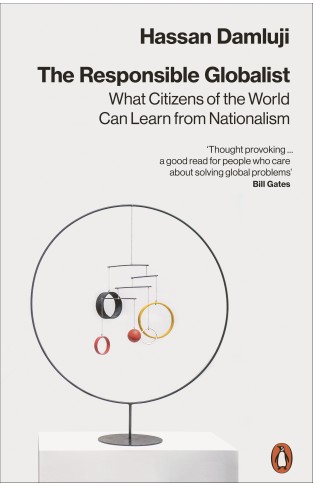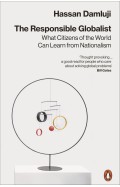- Home
- Online Book Bazar Up To 60%
- The Responsible Globalist : What Citizens of the World Can Learn from Nationalism
The Responsible Globalist : What Citizens of the World Can Learn from Nationalism
By: Hassan Damluji
-
Rs 1,345.50
- Rs 1,495.00
- 10%
You save Rs 149.50.
Due to constant currency fluctuation, prices are subject to change with or without notice.
Today, globalism has a bad reputation. 'Citizens of the world' are depicted as recklessly uninterested in how international economic forces can affect local communities. Meanwhile, nationalists are often derided as racists and bigots. But what if the two were not so far apart? What could globalists learn from the powerful sense of belonging that nationalism has created? Faced with the injustices of the world's economic and political system, what should a responsible globalist do?
British-Iraqi development expert Hassan Damluji proposes six principles - from changing how we think about mobility to shutting down tax havens - which can help build consensus for a stronger globalist identity. He demonstrates that globalism is not limited to 'Davos man' but is a truly mass phenomenon that is growing fastest in emerging countries. Rather than a 'nowhere' identity, it is a new group solidarity that sits alongside other allegiances.
With a wealth of examples from the United States to India, China and the Middle East, The Responsible Globalistoffers a boldly optimistic and pragmatic blueprint for building an inclusive, global nation. This will be a century-long project, where success is not guaranteed. But unless we can reimagine humanity as a single national community, Damluji warns, the gravest threats we face will not be defeated.
Today, globalism has a bad reputation. 'Citizens of the world' are depicted as recklessly uninterested in how international economic forces can affect local communities. Meanwhile, nationalists are often derided as racists and bigots. But what if the two were not so far apart? What could globalists learn from the powerful sense of belonging that nationalism has created? Faced with the injustices of the world's economic and political system, what should a responsible globalist do?
British-Iraqi development expert Hassan Damluji proposes six principles - from changing how we think about mobility to shutting down tax havens - which can help build consensus for a stronger globalist identity. He demonstrates that globalism is not limited to 'Davos man' but is a truly mass phenomenon that is growing fastest in emerging countries. Rather than a 'nowhere' identity, it is a new group solidarity that sits alongside other allegiances.
With a wealth of examples from the United States to India, China and the Middle East, The Responsible Globalistoffers a boldly optimistic and pragmatic blueprint for building an inclusive, global nation. This will be a century-long project, where success is not guaranteed. But unless we can reimagine humanity as a single national community, Damluji warns, the gravest threats we face will not be defeated.
The Responsible Globalist : What Citizens of the World Can Learn from Nationalism
By: Hassan Damluji
Rs 1,345.50 Rs 1,495.00 Ex Tax :Rs 1,345.50
Zubin Mehta: A Musical Journey (An Authorized Biography)
By: VOID - Bakhtiar K. Dadabhoy
Rs 892.50 Rs 1,050.00 Ex Tax :Rs 892.50
Studies in Islamic Law Religion and Society
By: Harbans Singh Bhatia
Rs 845.75 Rs 995.00 Ex Tax :Rs 845.75
Chip War: The Fight for the World's Most Critical Technology
By: Chris Miller
Rs 3,865.50 Rs 4,295.00 Ex Tax :Rs 3,865.50
What They Still Don't Teach You At Harvard Business School
By: Mark H. Mccormack
Rs 2,695.50 Rs 2,995.00 Ex Tax :Rs 2,695.50
Hegemony Now: How Big Tech and Wall Street Won the World (And How We Win it Back)
By: Alex Williams
Rs 5,035.50 Rs 5,595.00 Ex Tax :Rs 5,035.50
The Origins of Political Order From Prehuman Times to the French RevolutioN
By: Francis Fukuyama
Rs 4,045.50 Rs 4,495.00 Ex Tax :Rs 4,045.50
Manning Up: How the Rise of Women Has Turned Men into Boys
By: Kay Hymowitz
Rs 895.50 Rs 995.00 Ex Tax :Rs 895.50
The Obama Syndrome: Surrender At Home War Abroad
By: Tariq Ali
Rs 1,100.75 Rs 1,295.00 Ex Tax :Rs 1,100.75
The Quest For Meaning: Developing A Philosophy Of Pluralism
By: Tariq Ramadan
Rs 1,185.75 Rs 1,395.00 Ex Tax :Rs 1,185.75
The Pakistan US Conundrum Jihadists The Military And The People The Struggle For Control
By: Yunas Samad
Rs 1,185.75 Rs 1,395.00 Ex Tax :Rs 1,185.75
An Enemy We Created: The Myth Of The Taliban Al Qaeda Merger In Afghanistan 19702010
By: Alex Strick van Linschoten
Rs 4,462.50 Rs 5,250.00 Ex Tax :Rs 4,462.50
WikiLeaks: Inside Julian Assanges War on Secrecy
By: David Leigh & Luke Harding
Rs 765.00 Rs 850.00 Ex Tax :Rs 765.00
Studies in Islamic Law Religion and Society
By: Harbans Singh Bhatia
Rs 845.75 Rs 995.00 Ex Tax :Rs 845.75
Chip War: The Fight for the World's Most Critical Technology
By: Chris Miller
Rs 3,865.50 Rs 4,295.00 Ex Tax :Rs 3,865.50
What They Still Don't Teach You At Harvard Business School
By: Mark H. Mccormack
Rs 2,695.50 Rs 2,995.00 Ex Tax :Rs 2,695.50
Hegemony Now: How Big Tech and Wall Street Won the World (And How We Win it Back)
By: Alex Williams
Rs 5,035.50 Rs 5,595.00 Ex Tax :Rs 5,035.50
No recently viewed books available at the moment.
Zubin Mehta: A Musical Journey (An Authorized Biography)
By: VOID - Bakhtiar K. Dadabhoy
Rs 892.50 Rs 1,050.00 Ex Tax :Rs 892.50
The Responsible Globalist : What Citizens of the World Can Learn from Nationalism
By: Hassan Damluji
Rs 1,345.50 Rs 1,495.00 Ex Tax :Rs 1,345.50
Studies in Islamic Law Religion and Society
By: Harbans Singh Bhatia
Rs 845.75 Rs 995.00 Ex Tax :Rs 845.75
Chip War: The Fight for the World's Most Critical Technology
By: Chris Miller
Rs 3,865.50 Rs 4,295.00 Ex Tax :Rs 3,865.50
What They Still Don't Teach You At Harvard Business School
By: Mark H. Mccormack
Rs 2,695.50 Rs 2,995.00 Ex Tax :Rs 2,695.50
Hegemony Now: How Big Tech and Wall Street Won the World (And How We Win it Back)
By: Alex Williams
Rs 5,035.50 Rs 5,595.00 Ex Tax :Rs 5,035.50














-120x187.jpg?q6)










-120x187.jpg?q6)



-120x187.jpg?q6)



